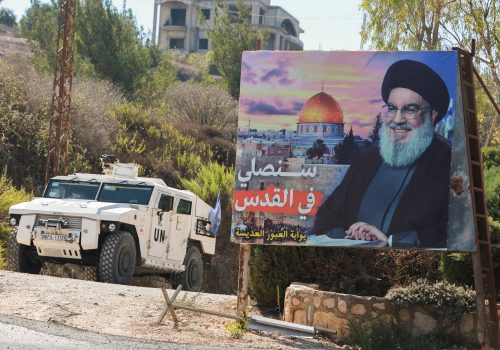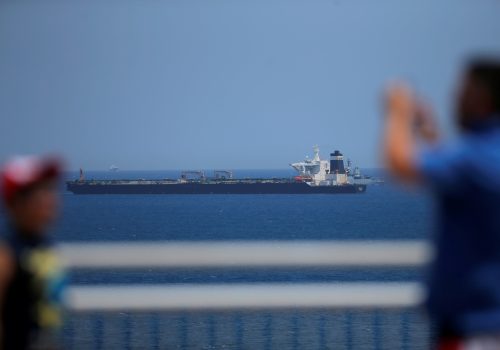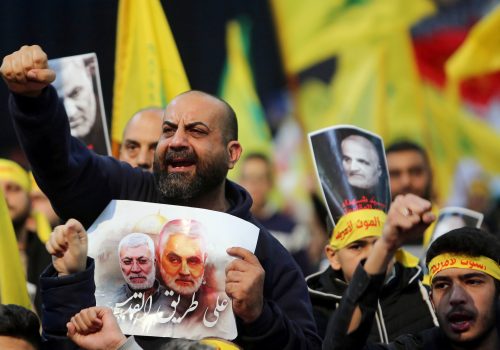The attacks on Israel should be a wake up call for the Lebanese people
On April 6, thirty-four rockets were launched toward northern Israel from Qlaileh—a southern Lebanese town near the city of Tyre—controlled by Hezbollah, marking one of the highest points of escalation between the two countries since the 2006 war.
The attacks, which Israel blamed on Palestinian militant group Hamas, came a day after Israeli Defense Forces (IDF) stormed Aqsa Mosque in Jerusalem, attacking Palestinian worshippers as they performed their Ramadan prayers. While neither Hamas nor Hezbollah officially claimed responsibility for the aggression, it was hardly a coincidence that those attacks took place amid the visit of Hamas’ political chief, Ismael Hanieh, to Lebanon (the visit was meant to discuss “the readiness of the ‘axis of resistance’”—made up of the Islamic Revolutionary Guard Corps (IRGC), Hezbollah, Hamas, and Palestinian Islamic Jihad—against Israel).
The events also followed increased attacks in Syria that targeted Iranian facilities and a flare-up along the Lebanese-Israeli border earlier this year. It is inconceivable that Hezbollah, the region’s most successful militant non-state actor—whose raison-d’être relies on its resistance against Israel and liberation of the Gaza Strip—was simply unaware of the infiltration of its highly monitored grounds. Therefore, attribution of who fired the rockets is only part of the story, as Hezbollah turning a blind eye towards Hamas’ plans makes the Lebanese militant group complicit in the event.
What’s more significant, however, was Hezbollah’s tactical disownment of the aggression, and Israel’s quick assessment that the airstrikes constituted “a Palestinian-oriented event” that Hezbollah knew about as it revealed that both countries are not willing to launch a full-fledged war. In response, Israel responded with a “strong, swift and precise” response, according to Israeli Prime Minister Benjamin Netanyahu, by carrying out a series of airstrikes that struck near Palestinian camps in southern Lebanon and the Gaza Strip, signaling to Hamas, Hezbollah, that further attacks will not be tolerated.
While the international community should condemn Israel’s provocative storming of Aqsa Mosque as it violates international law, an offense by Hezbollah—direct or not—that signals its disapproval with the Israeli government’s actions could easily turn all Lebanese hostages into an all-out war. If there’s one thing that the Lebanese people should remember from their bloody fifteen-year civil war (1975-1990), is that fighting others’ wars at the expense of their national interests will only cause more doom.
Lebanon, which has been in an economic free fall for four years, is already on the brink of becoming a collapsed state, with serious humanitarian crises as 80 percent of its population lives under the poverty line and two million of its residents—which includes refugees—suffer from food insecurity, making its involvement in a large-scale war a suicide mission. Such a scenario, as evidenced by the recent events, would only deepen Lebanon’s compromised sovereignty, as such escalation actions would be initiated directly by Hezbollah—or its allies—rather than the country’s legal authority, reaffirming the party’s well-maintained state-within-a-state apparatus.
Indeed, shortly after the attack, the Lebanese government—effectively leaderless since November 2022 after the end of its president’s term with no successor or affirmed cabinet ministers—reaffirmed its commitment to United Nations Security Council Resolution (UNSCR) 1701, which calls for the “full cessation of hostilities” along the Lebanese border. However, the call came hours short before officially condemning the use of its territories as an arena of aggression. This limited and delayed reaction reaffirms the government’s de facto subservience to Hezbollah’s interests, and by extension, the broader regional endeavors of the Islamic Republic, which it pursues through its proxy militias. Moreover, while the Lebanese Ministry of Foreign Affairs quickly moved to submit an official complaint to the UN Security Council regarding the impact of the Israeli bombing and deliberate aggression, much less has been done to address the undermining of its government’s sovereignty when its territories were used to launch the rockets in the first place. While the Lebanese people held their breaths in anticipation of Israel’s reprisal, they were reminded, once again, that their country’s security remains at the mercy of Hezbollah, and that it will continue to do so, as long as the use of force is not consolidated within the country’s legal central authority.
Going through its sixth month of deadlock, Lebanon’s divisive presidential election has been central to Hezbollah’s attempts to legally take control over the country, which varied between employing its affiliated parliament members to boycott voting sessions and cast empty votes, and just recently backing Suleiman Frangieh, a pro-Syrian candidate. But the latest events should remind all Lebanese of the dangers associated with a political concession that hands over the presidency to the Shia party, as it threatens an official transfer of the country’s sovereignty to Iran.
The rocket fire from Lebanon on April 6 highlights how Hezbollah continues to act as a separate military and political entity in the country—considering itself entitled to maneuver partnerships that fall outside of the official realm of the Lebanese government—with external militia groups holding goals and ideologies that further Iran’s regional endeavors. Hezbollah’s capability to undermine the government’s national sovereignty and supreme authority stems from the party’s control over illegitimate weapons and the political protection to maintain this status quo that it receives from its constituents in government. If Hezbollah can enjoy this much impunity within the current laissez-faire environment that protects its interests, the leeway it will receive under a president with its backing will lead Lebanon on a much darker path.
Nour Dabboussi is the program assistant to the Atlantic Council’s Rafik Hariri Center and Middle East Programs.
Further reading
Wed, Apr 5, 2023
A series of unrelated events happened in Israel. Fingers are pointing at Hezbollah.
IranSource By David Daoud
Tensions have been unusually high along the Lebanese-Israeli border. But war, or a large-scale conflagration, is not imminent.
Mon, Mar 13, 2023
Iran is still exporting oil to Hezbollah and the Assad regime. It’s using Syrian ports for transit.
IranSource By
Despite sanctions imposed on both countries, Tehran has continued to use Syrian ports as the main gateway to supply oil to its Lebanese proxy, Hezbollah, and its ally, the Bashar al-Assad regime.
Thu, Apr 30, 2020
Hezbollah considers the United States, not Israel, its greatest enemy
IranSource By
The Open Letter, Hezbollah's manifesto, reserves its highest level of opprobrium for America, labeling it the main root of evil and declaring the “confrontation with America” as the yardstick for all of Hezbollah’s other activities.
Image: A supporter of Lebanon's Hezbollah leader Sayyed Hassan Nasrallah uses a mobile phone to take a picture as he addresses his supporters through a screen in Beirut's southern suburbs, in Beirut, Lebanon January 19, 2023. REUTERS/Mohamed Azakir


